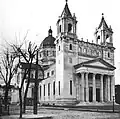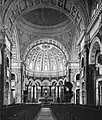| Cathedral of the Sacred Heart | |
|---|---|
.jpg.webp) | |
 | |
| 37°32′50.8″N 77°27′7.7″W / 37.547444°N 77.452139°W | |
| Location | 823 Cathedral Place Richmond, Virginia |
| Country | United States |
| Denomination | Roman Catholic Church |
| Website | www |
| History | |
| Consecrated | 1906 |
| Architecture | |
| Architect(s) | Joseph Hubert McGuire |
| Style | Renaissance Revival |
| Groundbreaking | 1903 |
| Completed | 1905 |
| Construction cost | $17588000 |
| Specifications | |
| Length | 206 feet (63 m)[1] |
| Width | 144 feet (44 m)[1] |
| Height | 144 feet (44 m)[1] |
| Materials | Virginia granite (foundation), Indiana limestone (walls), Copper (dome)[1] |
| Administration | |
| Diocese | Diocese of Richmond |
| Clergy | |
| Bishop(s) | Barry C. Knestout |
| Rector | Fr. Anthony E. Marques |
| Designated | 8 July 1982 |
| Reference no. | 82004584 |
| Designated | 5 July 1984 |
| Part of | Monroe Park Historic District |
| Reference no. | 84003572 |
| Designated | 15 December 1981[2] |
| Reference no. | 127-0137 |
The Cathedral of the Sacred Heart in Richmond, Virginia, is the seat of the Roman Catholic Diocese of Richmond. The property is located along North Laurel Street at 823 Cathedral Place, facing Monroe Park one block north of Main Street. Construction of the cathedral was begun in 1903, financed by donations of Thomas Fortune Ryan and his wife; it was the only cathedral at that time known to be constructed by the exclusive patronage of a single family.
The cathedral was completed in 1905 and consecrated on Thanksgiving Day, November 29, 1906. The cathedral is a Virginia Historic Landmark and is on the National Register of Historic Places.
The Cathedral of the Sacred Heart hosts the Catholic Campus Ministry for Virginia Commonwealth University.
Background
Virginia-born Thomas Fortune Ryan converted to Roman Catholicism en route to Baltimore, Maryland in 1868. In Baltimore Ryan made his fortune in railroads and streetcar transit and married Ida Mary Barry, the daughter of a Catholic former employer. Ida contributed to various Catholic charities and causes, including in Virginia, but the Ryans' philanthropy in Richmond increased after they purchased a 5,000 acres (2,000 ha) plot in Nelson County, Virginia. In 1901, Ida donated money to build a church dedicated to the Sacred Heart in Manchester (now part of Richmond) so that worshippers did not have to cross the James River for services. She also provided funds for the construction of a school, a new chapel convent, and churches in Harrisonburg and Newport News (St. Vincent de Paul Catholic Church). They also funded projects in Washington, D.C., and New York. In 1901, Ida and Ryan each donated $250,000 to build a cathedral overlooking Monroe Park near the Fan district—in today's money, equivalent to $17,588,000.[3]
Historically, Richmond did not have a large or influential Catholic population, but it was growing at the turn of the century. Part of the plot for the church had been owned by the Diocese since 1865. The parish had planned for a US$120,000 church at the location since 1882, but an effort to purchase the rest of the triangular block stalled until the Ryans' gift.[3]
Construction
The Ryans chose Joseph Hubert McGuire as the church's architect. The church, bishop's house and pastoral home fill the entire block. The cornerstone was laid June 4, 1903, by Father Conway of St. Ignatius, New York;[4] the stone block came from the Garden of Gethsemane.[3] According to a diocesan official, it was the only cathedral in the world erected through the "sole munificence of one family".[3][5]
The building is an example of Italian Renaissance Revival architecture. The exterior is constructed from Virginia granite and Indiana limestone; ceramic tiles and a copper-jacketed dome 118 feet (36 m) across complete the roof.[6] The cathedral's two front towers rise 90 feet (27 m). The portico is supported by fluted Corinthian columns; the entablature features the phrase "If Ye Love Me Keep My Commandments", while the underside of the pediment is lined with fireproof tiles designed by Rafael Guastavino.[3][7]
The cathedral was consecrated on Thanksgiving Day, November 29, 1906[6] in a series of ceremonies throughout the day. The church's consecration began at 6 am.[4]
In the time period following the Second Vatican Council, the cathedral made radical alterations to its interior. The original high altar was destroyed and a freestanding altar was installed. The nave was enlarged and room made for a larger, more open sanctuary. The marble altar rails, present in the building since its construction, were destroyed. Confessionals were repurposed into display cases. Iconography and statuary which had previously adorned the sanctuary was removed.
Landmark
The cathedral is a Virginia Historic Landmark and is on the National Register for Historic Places.[6]
Gallery
 A photograph of the cathedral from a 1914 publication
A photograph of the cathedral from a 1914 publication A photograph of the cathedral from a 1914 publication
A photograph of the cathedral from a 1914 publication.jpg.webp) The Absis and the dome
The Absis and the dome-HDR.jpg.webp) View down the nave to the chancel
View down the nave to the chancel.jpg.webp) Western portal of the cathedral
Western portal of the cathedral.jpg.webp) The crossing with the dome
The crossing with the dome.jpg.webp) The organ
The organ.jpg.webp) The altar
The altar
See also
References
- 1 2 3 4 "Cathedral of the Sacred Heart National Register Nomination" (PDF). Virginia Department of Historic Resources. Archived from the original (PDF) on January 25, 2017. Retrieved May 30, 2011.
- ↑ "Virginia Landmarks Register". Virginia Department of Historic Resources. Archived from the original on 2013-09-21. Retrieved 19 March 2013.
- 1 2 3 4 5 Slipek, Edwin (2005-01-19). "The Tycoon". Style Weekly. Landmark Media Enterprises. Archived from the original on 2013-02-03. Retrieved 2010-11-11.
- 1 2 Staff (2010-11-29). "Ryan's New Cathedral Opened In Richmond; His Gift to Catholics Consecrated with Impressive Ceremonies". The New York Times. p. 9. Retrieved 2010-12-23.
- ↑ The Catholic Church in the United States of America: Undertaken to Celebrate the Golden Jubilee of His Holiness, Pope Pius X. Vol. 3. New York: Catholic Editing Company. 1914. p. 150.
- 1 2 3 Case, Keshia A (2010). Richmond: A Historic Walking Tour. Arcadia Publishing. p. 75. ISBN 978-0-7385-6668-9.
- ↑ "Richmond Cathedral: About Us". Cathedral of the Sacred Heart. 2010. Archived from the original on 2011-01-17. Retrieved 2010-12-28.


